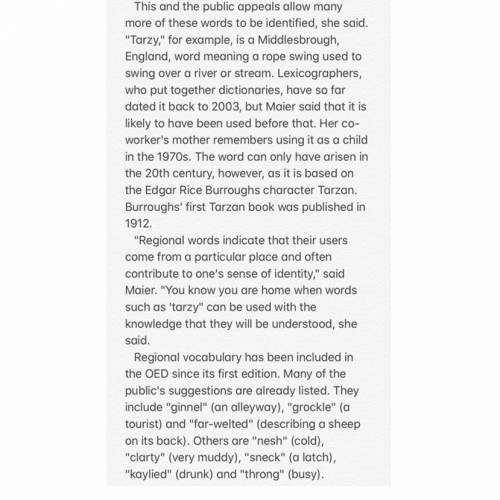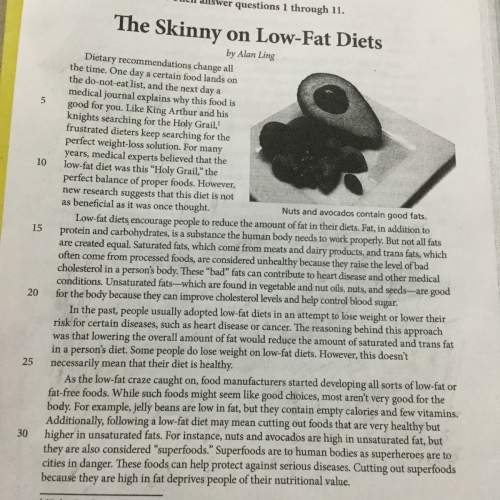
English, 19.05.2020 04:02 ethan62211
PLZZ write a short paragraph that explains the central idea of the article+use 2 details from the article to support the response.
—The English language is used in different and colorful ways around the world. The same words can be used in different ways, depending on where you live. People can also have completely different ways of saying the same thing.
The Oxford English Dictionary (OED) is asking the public to help it find the regional differences in English around the world. It wants to expand its record of the language, with early submissions ranging from New Zealand's "munted" to Hawai's "hammajang."
Last year, the OED, BBC Radio and the Forward Arts Foundation teamed up to find and define local words in the United Kingdom. It resulted in more than 100 new regional words and phrases being added to the dictionary. They ranged from Yorkshire's "ee bah gum" (oh!) to the northeast's "cuddy wifter," a left- handed person. Yorkshire is a county in northern England.
Now, the OED is widening its search to English speakers around the world. Associate editbr Eleanor Maier called the early response "phenomenal." Editors are beginning to draft a range of suggestions to include in the dictionary.
These range from Hawaii's "hammajang," meaning "in a disorderly state," to the Scottish word for a swimming costume, "dookers" or "duckers." There is also New Zealand's "munted," meaning "broken or wrecked."
**Words On The Short List**
The OED is also looking to include the word "chopsy," a Welsh term for an overly talkative person, "frog-drowner," which Americans might use to describe a torrential downpour of rain, and "brick," which means "very cold" to residents of New Jersey and New York City. The dictionary is also looking at adding "round the Wrekin." It is a phrase from the middle of England, which means "in a lengthy or roundabout manner."
The dictionary has already found that, depending on location, a picture hanging off center might be described as "agley." It might also be called "catawampous," "antigodlin" or "ahoo." A loved one could be called a "doy," "pet," "dou-dou," "bubele," "alanna" or "babber."
"The OED aims to cover all types of English, including standard English, scientific and technical vocabulary, literary words, slang and regionalisms. So it's important to include these words to enable us to present a picture of the Enalish lanauage." said Maier.
The Words Where You Are appeal is looking for more suggestions. These words will go with the regional words suggested by people in the U. K. last year. In that request, BBC Radio listeners were asked to send in their local turns of phrase. Those were later used in poems by authors including Liz Berry and Hollie McNish for a National Poetry Day project.
"We were surprised and pleased by the number of regional words we were able to include as a result," said Maier. "With the public's suggestions as a starting point, we were able to unearth a rich seam of regional vocabulary."
**Words That Come From A Specific Place
Some of the words suggested in the U. K. date back centuries, such as "zamzawed." It's a term in Devon for food that has been spoiled by overcooking. Devon is a county in southwest England. Then there are more recent coinages such as "jarg," used in Liverpool to refer to something false or misleading. Liverpool is a city in northwest England. Other additions now in the OED include "antwacky," meaning old-fashioned, and "barry," meaning great, with more to come. Maier said thatit can be difficult for the OED's editors to identify regional words. The expressions are more often spoken than written down. The editors require citable evidence to include a new definition.
"In recent years, resources such as Twitter have been a great way for us to monitor the words that people are using informally in particular parts of the world," she said.
*THE REST OF ARTICLE IS ON PICTURE*


Answers: 1
Another question on English


English, 21.06.2019 17:00
Ineed advice. i have a lot of friends at school but recently my best friend for some reason didn’t like our friend group. she wanted to switch to a new table during lunch. she said she found a new table where we would be welcomed if i wanted to come. i agreed because i knew i would continue to talk to them outside of lunch. after a month or two, my best friend got mad at our new lunch table group. so she left for a day or two, but i stayed because i actually kinda liked it there, even if it was kinda crazy. then she came back to the table. eventually i started to miss my old friends at my old lunch table. so i went over there for one lunch. then after lunch i sat at my new lunch spot before the bell rang. they all called me a traitor. so now i sit with my old lunch group, which is fine because i missed them, but i also miss my new, now old, lunch table. what should i do? p.s. sorry if you loose your last brain cells trying to understand this.
Answers: 2

English, 21.06.2019 22:00
In melville's "bartleby the scrivener," why does the narrator refuse to fire bartleby even after bartleby has told him he will never write for him again? select all that apply
Answers: 1

English, 22.06.2019 08:00
What are the similarities of physical and chemical change ?
Answers: 2
You know the right answer?
PLZZ write a short paragraph that explains the central idea of the article+use 2 details from the ar...
Questions


Mathematics, 08.12.2020 02:40

English, 08.12.2020 02:40



History, 08.12.2020 02:40


Health, 08.12.2020 02:40

Business, 08.12.2020 02:40

Mathematics, 08.12.2020 02:40


Physics, 08.12.2020 02:40







Mathematics, 08.12.2020 02:40




